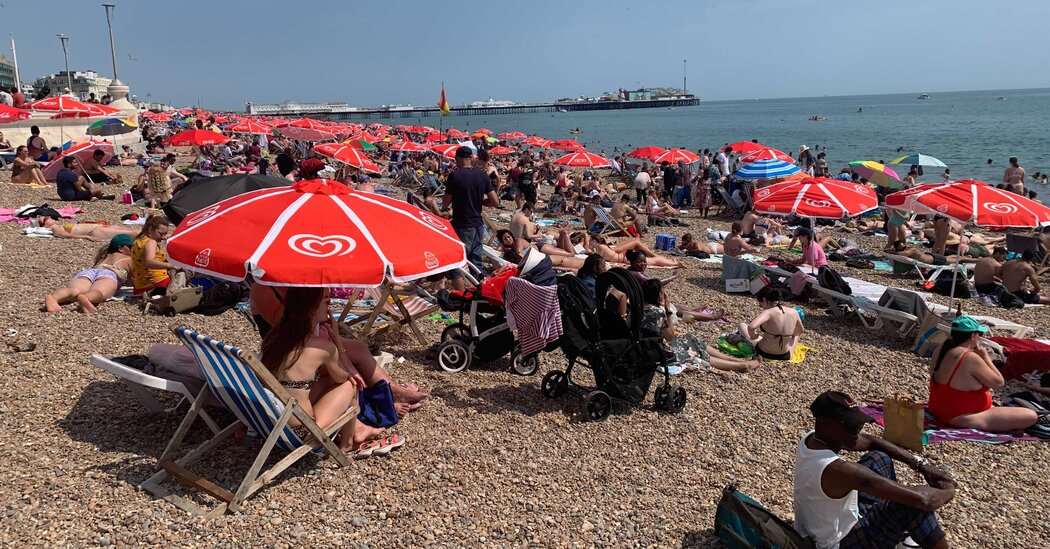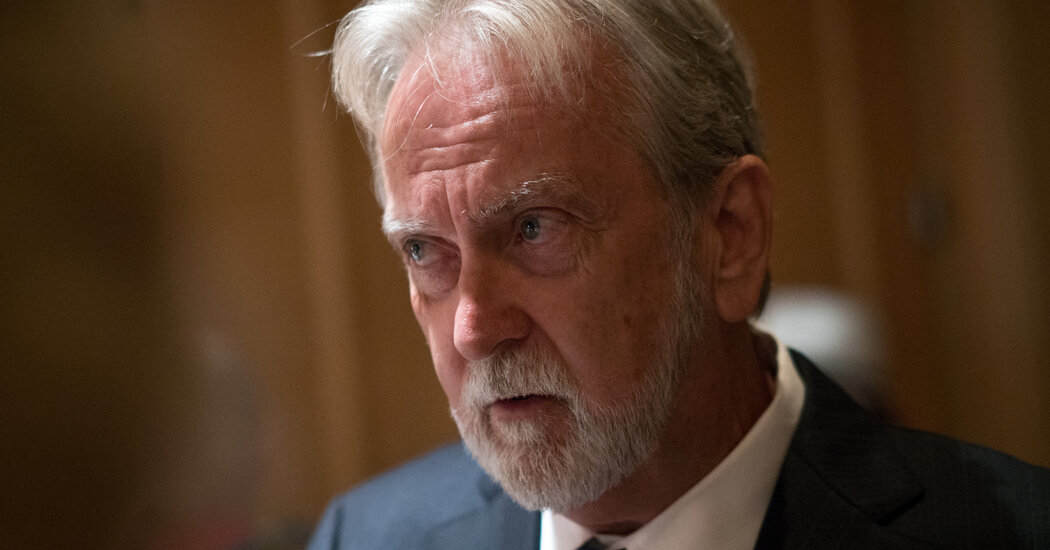
LONDON — Trains slowed to a crawl. Schools and doctors’ offices shut their doors. The British Museum closed its galleries. Buckingham Palace curtailed the changing of the guard. And the government urged people to work from home.
Much of Britain took an involuntary siesta on Monday as merciless heat filtered north from a fire-ravaged European Continent, driving temperatures close to triple digits Fahrenheit in many areas and reaching the hottest mark ever recorded in Wales.
Authorities placed most of the country under a “red” warning for heat for the first time in history, with the mercury hovering around 100 degrees (37.5 degrees Celsius) across London and the country’s south and Midlands. Britain’s top reading, 100.6 Fahrenheit (38.1 Celsius), did not quite reach the record of 101.7 set in Cambridge in July 2019, but to a sweltering nation, that felt like a distinction without a difference.
On the sweltering London Underground — most lines are not air-conditioned — Georgia McQuade, 22, lugged a heavy suitcase as she made her way to Victoria bus station, where she planned to catch a bus home to Paris.
“The Tube is really hot right now,” Ms. McQuade said. But she added, “I don’t want to get an Uber, because using cars so much is what caused this heat in the first place.”
She expected to encounter even more ferocious temperatures in Paris, as a mass of hot air has baked Italy and Spain over the past week and fanned wildfires in France and other parts of Europe, before spilling across the English Channel.
On Monday, French firefighters were battling two enormous wildfires that had torn through 55 square miles of dry pine forest in southwestern France over the past week, forcing about 16,000 people to evacuate.
For Britain, a nation known for its scudding clouds, frequent showers and temperate weather, the blast-furnace of Arizona-style heat was enough to disrupt much of the country. It even intruded into the political debate during a campaign season.
In the United States and other countries more accustomed to it, such heat might scarcely register. But essential infrastructure in those climates, from schools to public transportation to private homes, has been designed to deal with it, and people’s bodies are more acclimated to it.
In Britain, the houses, especially older ones, were built to retain warmth, and their residents are similarly outfitted. Britons, in fact, are famously unprepared for extreme weather of all kinds — whether winter blizzards or summer downpours — and pavement-shimmering heat is no exception.
Some train services were canceled while others ran at reduced speeds for fear that the rails could buckle. Luton Airport, north of London, closed briefly after the heat caused a “defect” in the runway, forcing flights, some from Mediterranean holiday resorts, to divert to other airports.
In London, the cast-iron chains and pedestals of the Hammersmith Bridge on the Thames were wrapped in reflective foil to shield them from the sun. Previous heat waves had caused cracks in the iron to widen, raising fears that the majestic but corroded 19th-century bridge could collapse.
A 14-year-old boy was missing Monday evening and believed to have drowned while swimming in the Thames, according to London’s police service, as thousands defied warnings and flocked to stretches of water to escape the heat.
The Royal Air Force halted flights into and out of its largest base as a preventive measure, a spokesman said, because tar on the runway may have melted. Alternative airfields were being used and Air Force operations were not affected, he added.
Officials urged people to use public transportation only if necessary, and to work from home Monday and Tuesday — a plea reminiscent of the depths of the coronavirus pandemic. But few homes have air-conditioning, forcing millions to choose between a torrid commute or a stifling home office.
“Our immediate concern is to get the country through the next 36 hours in as good a shape as possible,” said Kit Malthouse, the cabinet minister overseeing the government’s response. Forecasters warned that Tuesday would be even hotter, putting records again at risk.
Mr. Malthouse defended Prime Minister Boris Johnson, who stayed at his country residence, Chequers, and skipped crisis meetings of the cabinet. Mr. Malthouse said he was briefing Mr. Johnson, who announced his resignation after losing the support of his party two weeks ago, about the latest developments.
With the Conservative Party in the thick of a clamorous leadership race to replace Mr. Johnson, the weather has inevitably played into politics. Whatever the temperature, though, combating climate change has fallen well down the list of priorities.
Britain’s cost-of-living crisis has, for now at least, elbowed aside the country’s ambitious targets to reach net zero in greenhouse gas emissions by 2050. During a televised debate, four of the five candidates voiced only tepid endorsements of the policy while one expressed open doubts.
Prince Charles, the heir to Britain’s throne and a fervent climate change activist, waded into the debate, declaring on Monday that “those commitments around net zero have never been more vitally important as we all swelter under today’s alarming record temperatures across Britain and Europe.”
Blisteringly high temperatures are becoming more common globally, and climate scientists say that the burning of fossil fuels is a significant driver. Some of the recent heat extremes the world has experienced would have been virtually impossible without the influence of human-induced climate change, scientists have found.
Some critics argue that Britons habitually overreact to weather extremes. In February, nine train companies canceled their services when Storm Eunice battered the country with snow, rain, and winds of up to 90 miles per hour. Planes, buses, and ferries were also disrupted.
Still, on Monday, most Britons were dealing with the heat in time-tested ways.
Retailers in Britain reported skyrocketing demand for fans and air-conditioning units. A spokeswoman for John Lewis, one of Britain’s largest department stores, said on Sunday that sales of fans were up more than 250 percent in the past week, compared with the same period a year earlier, and air-conditioner sales were up more than 525 percent.
There is little data on how many homes in England have air-conditioning, but the best estimates place it at under 5 percent, according to a 2021 report from Britain’s Department for Business Energy & Industrial Strategy.
Hospitals and nursing homes were a particular concern, officials said, with many older and other vulnerable patients in buildings without air-conditioning. Officials urged schools, in their final week of classes before a break, not to close because it would leave children unsupervised in the heat — a directive that some education districts were ignoring.
For the most part, though, Britons endured it all with stoicism. Mona Suleiman, 45, and her friend, Zaina Al Amin, 40, were waiting for a bus in the afternoon sun and watched the temperature creeping steadily higher.
“I am not worried about myself in this heat,” said Ms. Suleiman, who is originally from Eritrea. “But I am worried about my children.”
Her apartment gets too hot, she said, and despite being advised to keep her children, 6 and 10, home from summer school, she decided to send them in because she thought it might be cooler there.
Ms. Al Amin said she and Ms. Suleiman, who wore traditional Eritrean dress and head scarves, did not mind the heat in their lightweight cotton clothing. But they worried about boarding the bus. “It’s too difficult,” she said. “There’s not enough air.”
Others in London seemed less bothered, like the four artists painting graffiti on a mural wall outside Trellick Tower, a high-rise apartment building. “This is nothing, mate,” one said. “I’ll be out here again tomorrow.”
For a few Londoners, the answer was to head for the beach. Sam Darlaston and Imogen Duffin took a midday train from Victoria Station to the seaside resort of Brighton. The friends, both 28, had made the impulsive decision to take the day off an hour before the train departed.
Mr. Darlaston, a radio host wearing a Hawaiian-themed shirt, said he was glad not to be back in a stuffy studio. “I thought I might have to work,” he said, “and sometimes at work you have to wear trousers and a shirt, if you’re interviewing someone.”
Reporting was contributed by Megan Specia, Stephen Castle, Euan Ward and Derrick Bryson Taylor in London, Constant Méheut and Aurelien Breeden in Paris, and Saskia Solomon in Brighton, England.




